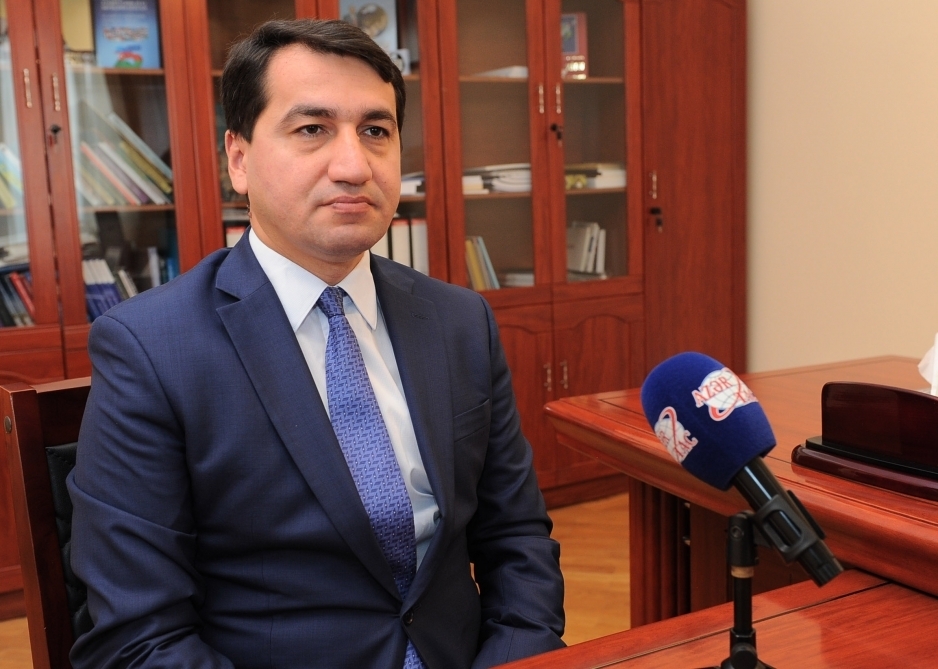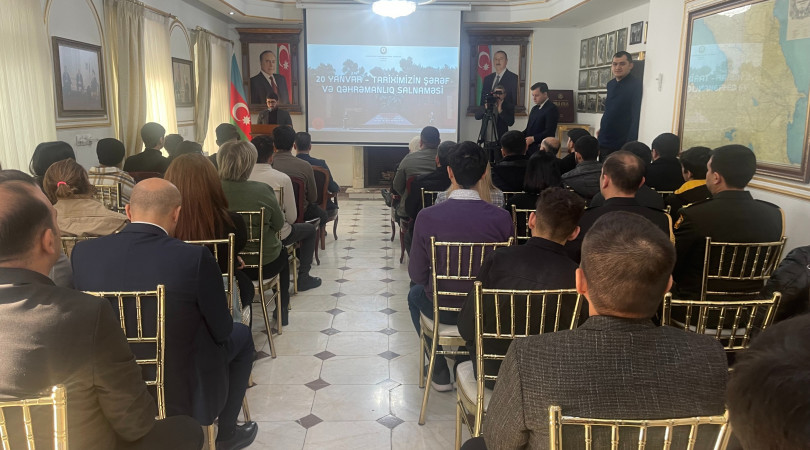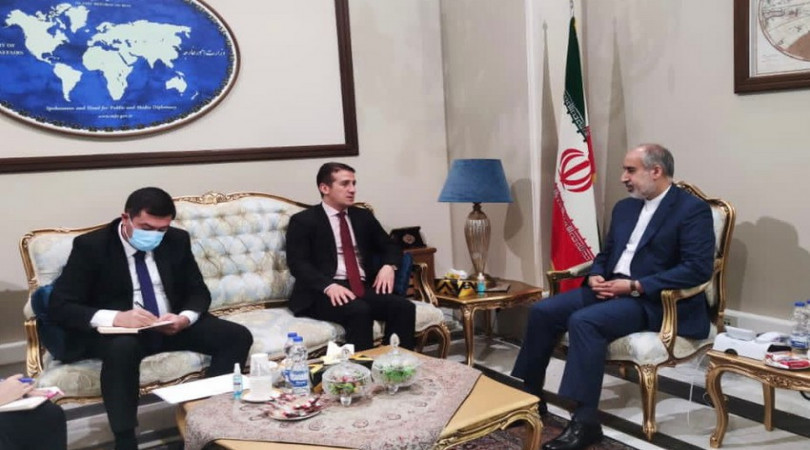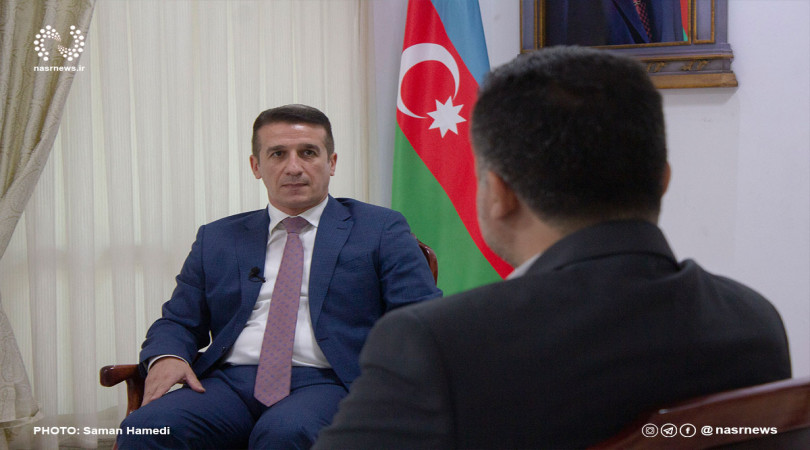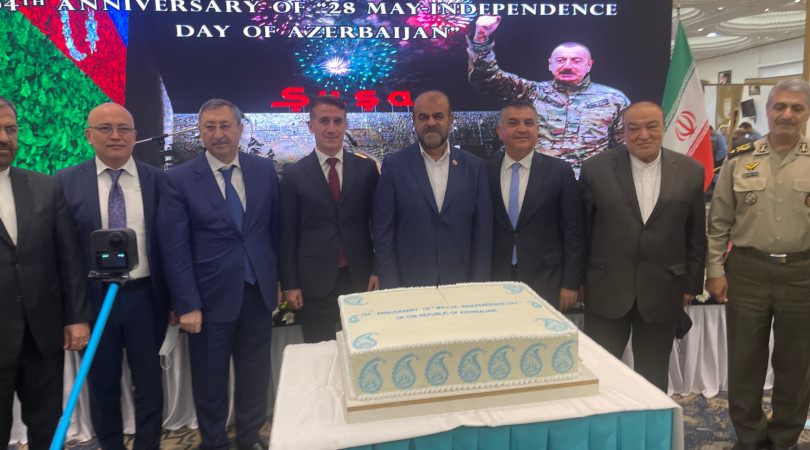Hikmat Hajiyev: Armenian PM has made a complete upside-down portrayal of political, legal and historical aspects of the Armenia-Azerbaijan Nagorno-Karabakh conflict from the UN podium
“The Prime Minister of Armenia has made a complete upside-down portrayal of political, legal and historical aspects of the Armenia-Azerbaijan, Nagorno-Karabakh conflict from the UN podium,” Head of Foreign Policy Issues Department of the Administration of the President of the Republic of Azerbaijan Hikmat Hajiyev has told AZERTAC as he commented on the remarks by Nikol Pashinyan, Prime Minister of Armenia at the general debates session of UNGA.
Hikmat Hajiyev said that the Armenian leadership appealing this August to annex the occupied lands of Azerbaijan when speaking publicly in the occupied Azerbaijani city of Khankendi and thus, dealing a serious blow to the negotiations process led with the mediation efforts of the OSCE Minsk Group, still attempts to mislead the international community now posing as ‘a peace pigeon’ from the UN tribune.
“First and foremost, Nagorno-Karabakh is the historical land of Azerbaijan and its integral part. On July 5, 1921, the Caucasus Bureau of the Communist (Bolsheviks’) Party’s Central Committee had decreed to keep Nagorno-Karabakh within Azerbaijan. Contrary to the false claims by the Armenians, decree never envisaged ‘handing over of Nagorno-Karabakh to Azerbaijan’.
Starting from the 80s of the past century, Armenia made overt claims concerning the Nagorno-Karabakh Autonomous Oblast (NKAO) of Azerbaijan and commenced active support of the violent actions and aggressive separatism.
Unilateral carving out of Nagorno-Karabakh without the permission of Azerbaijan ran in contradiction to the then Soviet laws, and it was corroborated at the level of the Supreme Constitution... After Azerbaijan had regained its independence, Nagorno-Karabakh was clearly considered the inalienable part of the Azerbaijani territory stemming from the legislation in force at that time. Armenian claims of 'uniting Nagorno Karabakh with Armenia’ or ‘granting it independence’ are in contrast with uti possidetis principle envisaged in the international law, and therefore, are groundless based on the very law. The uti possidetis principle clearly defines that Azerbaijan had declared its independence within the borders set by the Soviet laws before the declaration of independence.
Secondly, while speaking at the UN, Prime Minister of Armenia bypasses in silence the fact of flagrant violation of its obligations undertaken in line with the UN Charter. We should recall here Item 4 of Article 2 of the UN Charter that prohibits the threat or use of force and calls on all Members to respect the sovereignty, territorial integrity and political independence of other States.
According to the decisions of the International Military Tribunal in Nuremberg related to the outcomes of the World War II and the Chapter VII of the UN Charter under the title of ‘Action with respect to threats to the peace, breaches of the peace, and acts of aggression’, occupation and military aggression are defined as serious international crime.
Resorting to military force, Armenia has occupied the Nagorno-Karabakh region of Azerbaijan and seven adjacent districts and committed a bloody ethnic cleansing against the Azerbaijani population of those territories. That policy has resulted in the expulsion of over one million of our fellow compatriots that continue to live as refugees and IDPs. Furthermore, Armenia runs well-conceived activities to alter the demographic composition in the occupied territories of Azerbaijan in contradiction to the international humanitarian law and destroys the monuments of the tangible cultural heritage of the Azerbaijani people.
The UN Security Council has adopted the resolutions 822, 853, 874 and 884 in relation to the conflict. In those resolutions, the UN Security Council condemns the use of force against Azerbaijan, the occupation of the Azerbaijani territories, the attacks against civilians and shelling of the Azerbaijani lands serving as their shelters, and finally, reaffirms the Nagorno-Karabakh as the integral part of Azerbaijan, its territorial integrity, sovereignty and inviolability of borders. Likewise, the UN Security Council resolutions underline the inadmissibility of gaining territory by the use of force and demand full and unconditional withdrawal of the occupying forces from all occupied territories of Azerbaijan.
Armenia continues to ignore the decisions and resolutions of the UN Security Council and other international organizations.
We should also recall that Item 25 of the UN Charter stipulates that the UN member states shall accept and fulfill the decisions of the Security Council based on Charter.
The core of the mandate of the OSCE Minsk Group members mediating the resolution of the Armenian-Azerbaijani, Nagorno-Karabakh conflict stems from relevant resolutions of the Security Council.
Thirdly, Armenian leadership claims that there is no territorial conflict between Azerbaijan and Armenia by saying that this is a matter of human rights. The resolutions of the UN Security Council, the decision of the European Court of Human Rights with respect to the case of “Chyragov and others vs. Armenia” explicitly prove that the fundamentals of this conflict lie in the occupation of territories by the use of force. According to the verdict of the European Court of Human Rights, the fake regime created in the occupied territories of Azerbaijan exists thanks to the political, military, financial and other types of support by Armenia. The military presence of the Armed Forces of Armenia in the occupied territories of Azerbaijan and the continuation of occupation demonstrate explicitly the true nature of this conflict.
At the same time, if the Armenian leadership wishes to portray this conflict in the context of human rights, then it subsequently recognizes the bloody ethnic cleansing committed against over one million of Azerbaijanis and the violation of their fundamental rights. Human rights have a universal nature. It is the hypocrisy and foolishness of Armenia to talk about human rights when it has breached the fundamental rights of over one million Azerbaijanis through the occupation and military aggression.
Moreover, the Armenian leadership says that the conflict resolution should be based on the formula acceptable for all – Armenia, Nagorno-Karabakh and Azerbaijan. The sides of the conflict are Armenia and Azerbaijan. The Nagorno-Karabakh region of Azerbaijan has both Azerbaijani and Armenian communities.
Azerbaijan has no territorial claim to any State. The resolution of this conflict that is acceptable for Azerbaijan is based on the UN Charter, international law and justice, and this position is supported by the international community. To solve the conflict, it is imperative that the Armenian forces withdraw from the occupied territories of Azerbaijan, and end the military occupation that will make possible the return of Azerbaijani IDPs to their native lands and the restoration of the territorial integrity and sovereignty of Azerbaijan. A model of self-governance envisaging the peaceful and safe coexistence of Armenian and Azerbaijani communities of the Nagorno-Karabakh region of Azerbaijan within the borders of Azerbaijan shall be defined.
The statement of 9 March 2019 referred repeatedly by the OSCE Minsk Group co-chairs describes the road map leading to the conflict resolution.
There is no model of solving this conflict outside of the territorial integrity of Azerbaijan. The soonest resolution of the conflict can help to ensure durable peace and security in the region, improve the daily life of the Armenian community living currently in difficult conditions in the Nagorno-Karabakh region of Azerbaijan and lead to the development of Armenia herself.
And, finally, Armenia should understand that the military occupation of the Azerbaijani territories is not a means of resolution of the conflict and will never yield a political outcome so desired by Armenia.
As Armenia seeks groundless historical, populist and demagoguery arguments to justify its annexation policy and losing the time in vain, while misleading further its people and the international community, she would be would be better off withdrawing its troops from the occupied territories of Azerbaijan, fulfilling its international obligations, participating in constructive manner in the conflict resolution process,” Hikmat Hajiyev said.
https://azertag.az/en/xeber/1335376
